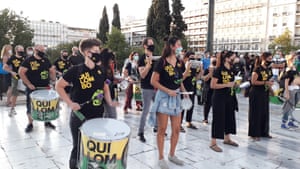
The Greek prime minister, Kyriakos Mitsotakis, has announced a one-month “action plan” that doubles up on the country’s coronavirus restrictions, writes Helena Smith, the Guardian’s Athens correspondent.
Addressing the nation, the centre right leader said that as of Tuesday the country would be divided into two zones: a high-risk red and orange zone and a less endangered yellow and green zone.
Athens and Thessaloniki, already hard hit by an alarming rise in confirmed coronavirus cases, will be included in the first with restaurants, gyms, theatres, cinemas and museums all being closed as of 6am on 3 November.
Mask-wearing will be mandatory nationwide, in and outdoors, while 50% of the labour force in both the public and private sector will be required to work from home, up from 40% previously. A nationwide curfew will also be imposed between midnight and 5am.
“My address today is what I never wanted to have to do,” Mitsotakis said. “But it is impossible to close my eyes to the harsh reality. I am forced, once again, to place the health and security of Greeks over every other choice.”
Unlike the lockdown this spring, the industry sector and retail outlets will not be affected by the new measures in an effort to keep the economy going. Schools will remain open and travel between regions will also be allowed.

Infections in Greece broke a fresh record on Friday, when health authorities recorded 1,690 new cases, up from 1,211 on Thursday, bringing the total number to 37,1965.
Covid-19 fatalities rose to 620 after the National Organisation for Public Health (EODY) registered a further five deaths. Friday’s infections marked the fourth straight day that confirmed cases have topped more than 1,000, up from a caseload in the low hundreds only weeks ago.
Mitsotakis, like other leaders, is keen to avoid a general lockdown because of the eviscerating effects it will have on an economy that is already one of the weakest in the EU.
Greece has fared relatively well compared with other European countries, but a surge in coronavirus cases has placed “the greatest ever” pressure on the health system and so needed to be addressed, the prime minister said earlier this week.


